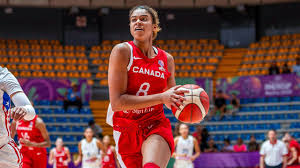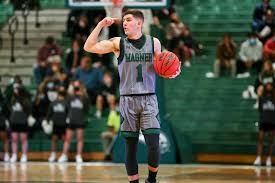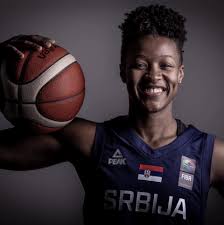The NBA Finals date back to 1947 (when they were known as the Basketball Association of America Finals) and the very 1st NCAA tourney was held in 1939. Olympic basketball competition is even older: it debuted as a demonstration event in 1904 and the men’s version became a medal sport in 1936, with the women finally getting their chance to go for the gold in 1976. The United States has dominated Olympic basketball competition from the start: the men have now won 17 gold medals in the 20 tournaments they have participated in during the past 88 years, while the women have won 10 gold medals in the 12 tournaments in which they have competed during the past 48 years. While we have to wait 4 years until the 2028 Olympics in Los Angeles, HoopsHD’s Jon Teitel will fill the void by interviewing as many prior Olympic players/coaches as possible. We continue our coverage by chatting with Cassandre Prosper about playing for Team Canada last summer and playing at Notre Dame this fall.

You were born in Montreal and played several different sports as a child: which sport were you best at, and which sport did you enjoy the most? I played volleyball/soccer/basketball/track. I was best at basketball/track, and liked track the most until about age 12/13, and then I got into basketball more. I had always finished 1st in track but after taking 1 year off and then finishing 3rd/4th I wanted to do something else. Track is an individual sport, but I liked basketball a lot because you are part of team.
In 2022 you were named the top high school basketball player in Canada: what did it mean to you to receive such an outstanding honor? It was a big deal! We won the league and I was named MVP, so it was great to be recognized like that after all those accomplishments/goals.
In November of 2022 you committed to Notre Dame and the following month you became the 2nd Irish women’s basketball player to ever enroll early (along with your teammate Olivia Miles): how difficult was it to start your college career in the middle of the season? It was challenging: not just coming from high school to college but learning all the plays. The team did a great job of teaching me what I needed to know for each game. I literally arrived 3 days before playing in my 1st game, but it is just basketball and my teammates/coaches made it easy on me.
Last fall you appeared in 5 games before suffering a lower leg injury that caused you to miss the rest of the season: how bad was the injury, and how is your health doing now? It was bad enough to keep me out for the season, and it got worse over time because I did not know how bad it was at the beginning. I chose to heal naturally because I was not comfortable with surgery that would put something in my leg for life: I wanted to let my body do whatever it wanted. It was a challenging year, but I learned a lot about myself. I love basketball but it is not who I am: being on the bench and watching the game gave me a different perspective. I am doing great now: it is fun to be back on campus and getting into the routine of the season.
Last spring your team won the ACC tourney and made the Sweet 16 before losing to Oregon State: what is the secret to winning games in March? There are so many things that lead to championships. In the ACC tourney our focus was on point. We had difficult conversations and great team meetings and were all aligned on our goals: we played with so much more heart. In March Madness the details really count because the margin of error is so small. As long as we learn from it we will be fine next March.
In the past 3 years you won a bronze medal at the 2023 FIBA Women’s AmeriCup, a bronze medal at the 2023 FIBA U-19 World Cup, and a silver medal at the 2021 FIBA U-16 Americas Championship: what does it mean to you to represent your country, and what is the key to winning medals? It never gets old to represent Canada: I have so much pride/gratitude while I am playing for my country. We had great team chemistry when winning those medals: we were not just playing for our team or our club but for our entire country. Those experiences have so much value because there are only 12 people who can do that. You are the best of the best but must bring your “A” game every time.
You played for Canada at the Olympics last summer: what is your favorite memory from your time in France? We played France in our 1st game, which was basically a home game for them. Listening to the national anthem and see all those fans was an amazing moment. My family was in the stands: if I close my eyes then I will always be able to imagine that moment.
You have a brutal non-conference schedule this year including Purdue/USC/Texas/UConn, as well as possibly Mississippi State/Utah in the Cayman Islands Classic: is there any 1 game that you feel will present your biggest test or that you are looking forward to the most? I am looking forward to the USC game because it is in November: we have been talking about it since last season. It will be 2 great teams competing on a national stage and we match up very well with them. It is our 1st “big” game so we are focused on it.
Your parents Gaetan/Guylaine both played college basketball, and your brother Olivier-Maxence now plays in the NBA: who is the best athlete in the family? My brother and I are both great athletes…but I would pick my mom. She coached both of us and is the most intense of all of us: she is very detailed in her knowledge of the game and has a lot of energy. She was a great player/coach and we love that.
In addition to you and Olivia both being healthy, your team returns 2024 All-American Hannah Hidalgo and brings in 2024 McDonald’s All-American Kate Koval: do you feel that your team has the talent to win it all next April? Definitely. Injuries have happened in the past, but our focus right now is chemistry and being purposeful in everything we do. We are aware of the prize but there are many steps to get there so we just try to win every day.





